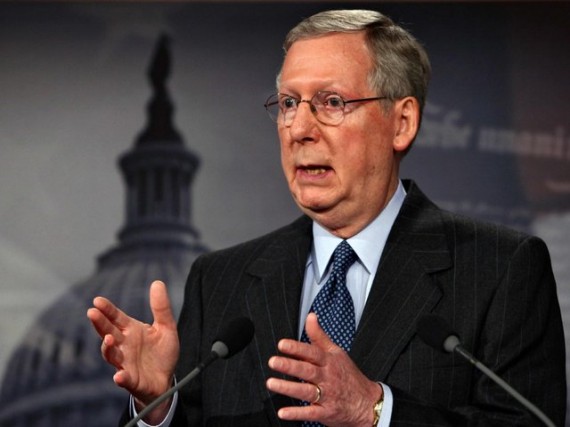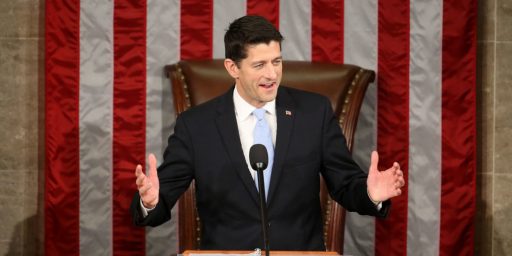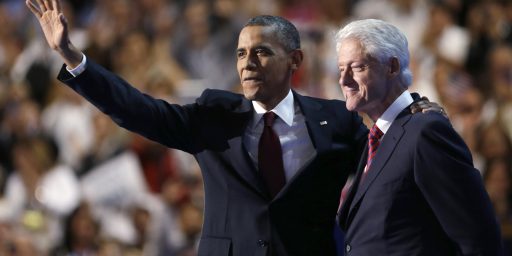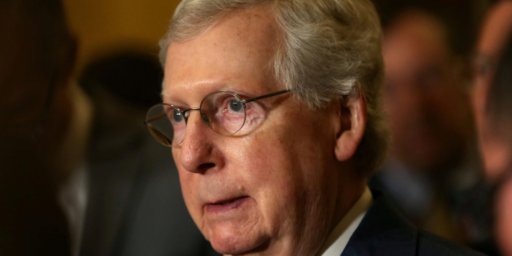The Genius of Mitch McConnell
The Senate Republican leader is running a shrewd political game. But what's good for the GOP is bad for America.
Ezra Klein writes a column “In praise of Mitch McConnell.” He’s not being sardonic.
In a city split between liars and idealists, McConnell is the rarest of all things: an honest cynic. He’s the only powerful politician in America willing to tell you how Washington actually works, and that’s why he needs to be heard.
McConnell’s first brush with radical truth-telling came in October 2010, when he told National Journal that “the single most important thing we want to achieve is for President Obama to be a one-term president.” McConnell quickly qualified his remarks, although he never quite apologized for them.
Nor should he have. McConnell wasn’t articulating a radical new theory of politics. He was telling us how he and his party were already voting. Consider the dozens of elected Republicans who, at one time or another, supported an individual mandate for health-care reform, cap-and-trade for carbon emissions and tax cuts for stimulative purposes. Over the past three years, almost all of them have renounced their former views. Unless you understand McConnell’s argument, you can’t understand their actions.
[…]
Many here understand a “bipartisan bill” to mean one with ideas from both parties. On deficit reduction, for instance, it would mean Democrats give in on spending cuts if Republicans give in on tax increases. McConnell understands it to be one with votes from both parties. That’s why he can keep a straight face while saying something like “President Obama needs to decide between his goal of higher taxes, or a bipartisan plan to address our deficit. He can’t have both.”
McConnell is right. Voters don’t spend their time conducting detailed analyses of legislation and neither — let’s be honest — do the media. Instead, both groups take their cues from political leaders. If the Republicans call a bill partisan and refuse to support it, the bill gets reported as partisan no matter its content.
[…]
There’s supposed to be a curb on this sort of behavior: If you don’t participate in the legislative process, you don’t get anything out of the process. Here’s McConnell’s most important insight: That’s wrong. Withholding minority-party votes forces the majority party to hand its most moderate members — and the most moderate members of the other party — an effective veto, which drags the legislation substantively to the center, and in the current situation, to the right.
Health-care reform was more conservative than it would have been if more Republicans had been willing to support it. The stimulus was smaller than it would have been if conservative senators had been willing to back the whole in return for concessions on the parts. It turns out that a partisan political strategy results in more bipartisan policy. The opposition can have its cake and eat it, too. That doesn’t leave much reason for it to be bipartisan, of course. But for a minority party that wants to defeat a president who sold himself as a unifier, that’s a plus.
I’ve made variations of this argument for month but Klein encapsulates it wonderfully. McConnell’s strategy may be cynical but it seems to be effective.
The obvious contrast is with Bob Dole at this point in 1995. Bill Clinton had come stumbling out of the gates, so much so that his party lost not only the Senate but, for the first time in decades, the House. If 2010 was a “shellacking” for the president’s party, 1994 was a good old fashioned ass whoopin’. Yet Clinton managed to rally back and sail to easy re-election in 1996.
Partly, this was a function of a rebounding economy. Partly, it was a function of Newt Gingrich being a much better revolutionary than Speaker. And partly it was Clinton’s brilliance as a politician. But another major piece of the puzzle was that the Republicans played into the Clinton-Dick Morris triangulation strategy, giving the president all manner of major legislative victories. Yes, they got most of what they wanted on the policy front on such things as welfare reform. But Clinton got what mattered more: The credit.
While Bob Dole was arguably more crucial in getting those bills passed in a form that appealed to the American public than Clinton, in doing so he undercut his own argument for why we needed a change in the White House. The public was quite happy with the results of a Democrat in the Oval Office and Republicans running the Hill and decided to keep that arrangement.
McConnell was around for all this and likely internalized the lesson.
There is, however, an important caveat to all this praise for McConnell: While it’s a brilliant strategy for an opposition party seeking to become the governing party, it’s incompatible with our institutional arrangements. Tight party discipline makes absolute sense in a parliamentary system with its “responsible government” model. But it’s a recipe for permanent stalemate in our system of checks and balances.
Yes, it makes it easier for the Republicans to regain the presidency. But it means that prize will be much less valuable if won, since the Democrats will surely employ exactly these tactics when the shoe is on the other foot.







“Yes, it makes it easier for the Republicans to regain the presidency. But it means that prize will be much less valuable if won, since the Democrats will surely employ exactly these tactics when the shoe is on the other foot.”
While on some levels I hope you are right, I suspect this is not true. Since the Democrats occupy a wider ideological range than Republicans, especially on economic issues, I doubt the Repuclicans will have trouble finding a handful of Democratic votes on their priorities, as they did during the Bush the Younger’s Administration
We’ll see.
The charge that the Republicans are deliberately trying to sabotage America’s economy ahead of 2012 is picking up steam…and it’s true.
It’s been a frustration to me that the unspoken consensus in the US is that Democrats are expected to be responsible, but Republicans are judged on some kind of weird curve. So a powerful Republican can say “no compromise” but if a Democratic were to employ such tactics he would be slammed by the media and by his own party. A Republican can repeatedly lie, and yet be invited onto the Sunday talking head shows over and over. A Democrat caught in repeated lies would be ostracized.
Republicans will put party ahead of country. I don’t think Democrats will. So in the partisan game, that’s a loss for Democrats.
It’s probably more a case of both sides thinking “What’s good for General Motors is good for the country”, so to speak. They put party ahead of country because they can’t distinguish between the two.
Help me out here: Twice in recent years I’ve seen current Republican or House leaders explicitly state that there is nothing more important in their agenda than defeating Democrats. Once was an interview with (by then former) leader Dick Armey, where he could not fathom cooperating with the Democrats in any way shape or form. When the interviewer challenged him to imagine something that would be for the good of the country that they would need to work together on, he couldn’t even get a grip on the question and simply went on and on about how the Democrats were bad and nothing was more important than getting them out of office. Does anyone have a link?
And then more recently, one of the current Republican leaders was caught saying that now they had the house the most important thing they would do with their power was assure that Obama lost re-election. Anyone have a link to that one?
@michael reynolds: I think @stormy dragon gets it right. The polarization has reached the level where it’s unfathomable that there’s anything more important than getting Democrats out of power, since they’re evil people who hate America.
James,
“The polarization has reached the level where it’s unfathomable that there’s anything more important than getting Democrats out of power, since they’re evil people who hate America.”
This strikes me as more of an agreement with Michael than Stormy. It would not be if your comment worked in both directions across the political aisle.
Ok Michael – So only Republicans put party ahead of country. An interesting observation.
Please explain what you think the difference would be, if any, from Democratic Senators and Congresscritters to either BHO or GWB putting us on a path to spend over a billion dollars deploying a carrier attack group, launching air strikes and cruise missile bombardments of military targets in a foreign country, and then make the Orwellian claim that this action does not meet the definition of “hostilities” as a rationale for ignoring the Constitution and War Powers Act and insisting Congress is not needed to authorize that action (Check the Democratic House Vote on Friday to authorize the action in Libya)
For extra credit, explain why Patrick Leahy and other Democratic Senators created websites, solicited funds, organized rallies and launched non-stop PR and and media campaigns to protect the assault on Habeas Corpus under GWB, and we’ve had nothing but crickets chirping from most Dems while the Obama administration defends and expands the identical policies.
There are many more examples along these same lines. Feel free to explain the muted response of Democrats to Obama exercising the identical expansion of “unitary executive” powers the was the subject of such hue and cry (legitimately so in my mind) during the Bush administration.
Warning. These are trick questions. I already know the answer. This is really about how you perceived reality. To whit – for the most part…
Republicans only behave like principled Republicans when there is a Democrat in the White House.
Democrats only behave like principled Democrats when there is a Republican in the White House.
– to about the same degree. I submit that if you really see it with the black/white absolutist sense of your comment in this thread, then your comment reveals more about your partisan blinders than anything else.
Sounds like an argument for smaller government.
Cynical and somewhat fair. Though strikes me that this ignores the minor and major accomplishments that each party achieves while in power that they do believe is for the good of the country.. But again, as you said, this shouldn’t be black and white.
That said, the “principled” Republican stance seems to be that the only way to “balance” the budget is through selective spending reductions (in particular the reduction/elimination of previous social welfare contracts) without honestly addressing the issue of Military Spending (I like the constant “Peace through strength” refrain that Bachmann is using) and an ongoing commitment to the reduction (if not flat out elimination) of income taxes. This sort of extreme position — at least in terms of the House Republicans — seems to epitomize emotional politics over sensible policy.
I don’t think you can discern any relative “fairness”, “balance” or “principle” between the two parties by pointing at any particular posture struck during a blink contest negotiation. Both sides know that it cannot be settled except on the brink, and both know it will absolutely be settled before a debt ceiling default. Neither side can satisfy their constituency and will take considerable political risk if they compromise too early.
If you accept that they are both arguing from principle (i.e. sincerely believing they are fighting for a position that their constituency holds dear) then it follows that both sides must maintain the posture that they are willing to let a debt ceiling default take place rather than compromise their principles. To do otherwise would undermine their negotiating position and be a betrayal of the people who elected them.
The only thing that provides political cover for a compromise for both sides is the deadline and the dire consequences of missing the deadline. So there will be a compromise. The compromise will include some formula for revenue increases, (probably in the form eliminating deductions while reducing rates), it will include cuts to the military, and it will include deep meaningful and substantial cuts in spending in the overall budget. And the compromise will be agreed on the brink of default to no ones satisfaction. As it should be.
In the meantime, we have six weeks of Kabuki theater to enjoy while the eventual compromise is hammered out. Both tribes will have ample opportunity to point at the feckless hypocrisy of the other. Enjoy the show.
Cyncial? Perhaps. Oddly I become almost euphoric and filled with optimism watching this peformance. It reinforces for me that I do not need to put any faith in the motivations of the politicians of either party. It is enough to know that we have a system that was designed to anticipate this kind of political conflict – in fact – to insist on it and institutionalize it. As Madison said in Federalist #51 “Ambition must be made to counteract ambition.” and out of the conflict inherent in a government run by men and not angels we will get a better result than we would in the absence of the checks they put on each other. Madison again in Federalist #10:
The time to worry is when they are not fighting each other to a standstill. That usually means the system is not working as it should and power is too concentrated. Or it means we are going to war.
So I’ll vote for Obama’s re-election in 2012 to keep the likely Republican controlled Congress acting like principled Republicans. Just like I voted for McCain in 2008 in the hope that would keep the Democratic controlled Congress acting like principled Democrats. We’d be better off now, and the Dems would be in better shape politically, if he had won then.
A lot to think about in there Dividist. Really thoughtful stuff.
The only question that I have (or rather fear) is that when one of the two parties is divided, how might that effect the overall equation.
It seems somewhat apparent that, at least in the matter of budget, the Republican House is divided, and there appear to be a critical mass of “true believers” who are not prepared to support either (a) any increase in taxes or (b) the general idea of raising the debt ceiling period.
I’m sure we’ve had these moments before, but as with the government shutdown, is there a real chance that the balance you seek will fail because what appears to be Kabuki theatre between two parties is really between three?